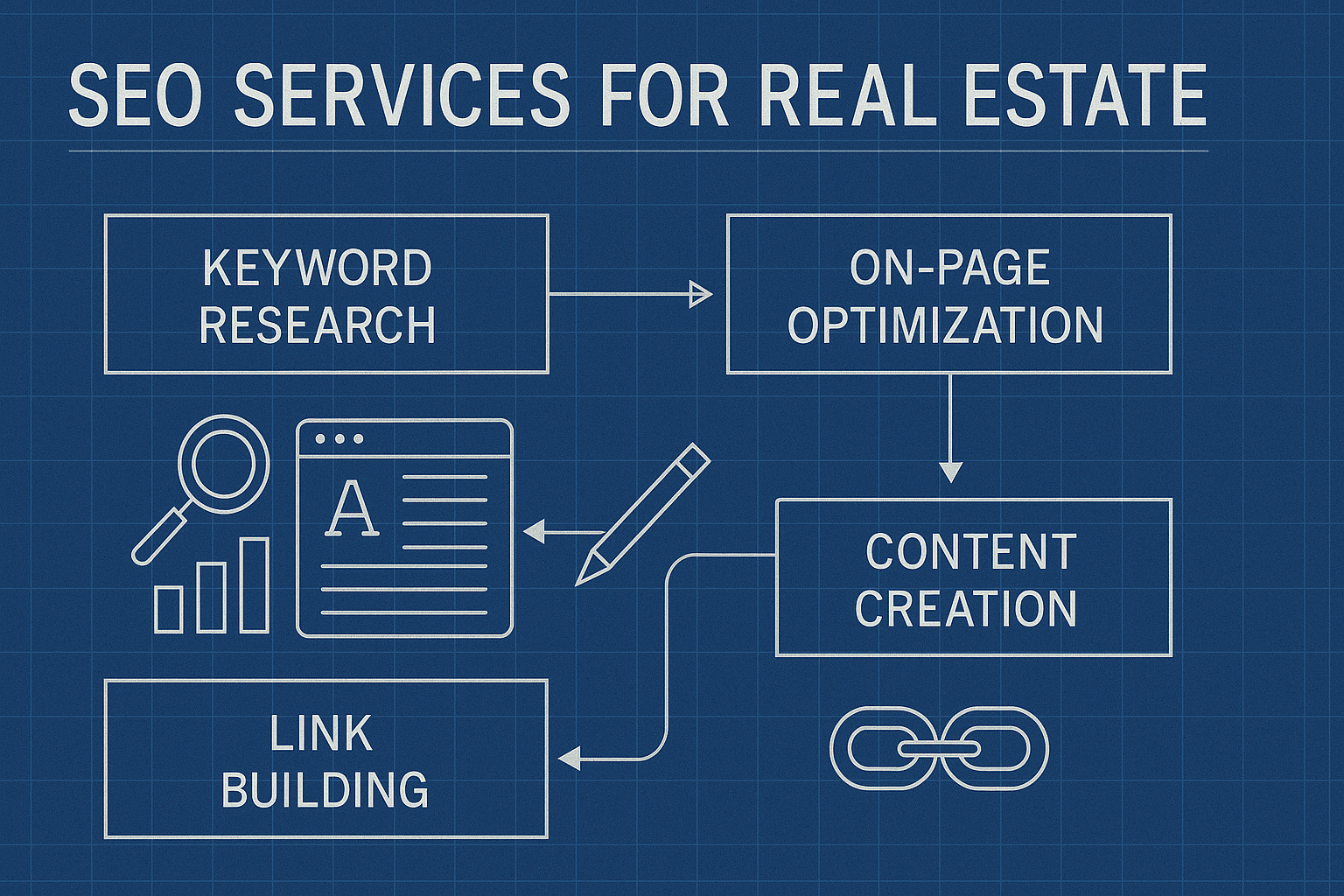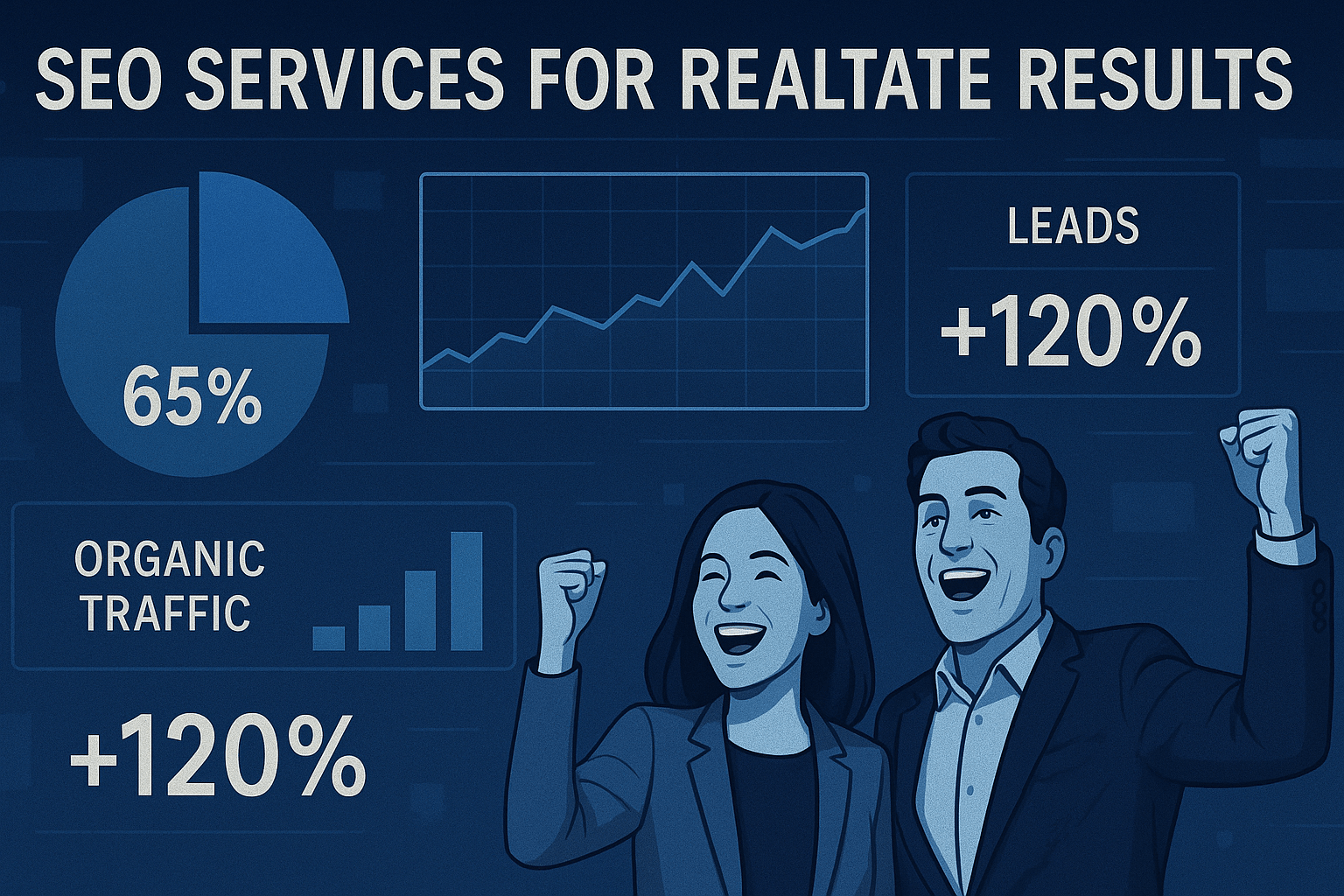Data-Driven SEO Services for Real Estate: Turn Properties Into Search Magnets
by Design Delulu Editorial · October 28, 2025

Smart, fast, and measurable. Here's how seo services helps real estate win.
The real estate market has fundamentally shifted. Today's homebuyers and sellers begin their journey with a search query, not a phone call. Over 97% of homebuyers use the internet during their home search, and if your real estate business isn't showing up in those critical first moments, you're losing qualified leads to competitors who are. The stakes have never been higher, and traditional marketing approaches simply can't compete with the precision and reach of strategic SEO.
Here's the challenge most real estate professionals face: you're competing against massive listing aggregators, national brokerages with deep pockets, and hundreds of local competitors—all fighting for the same search visibility. Without a data-driven SEO strategy, you're essentially invisible to the motivated buyers and sellers actively searching for properties in your market. The good news? Search engine optimization for real estate isn't about outspending your competition—it's about outsmarting them with targeted, measurable strategies that connect you with ready-to-transact clients at exactly the right moment.

Why Real Estate SEO Services Matter More Than Ever
The real estate industry operates in one of the most competitive digital landscapes imaginable. While paid advertising can deliver quick wins, it's expensive and stops working the moment you stop paying. SEO for real estate builds sustainable, long-term visibility that compounds over time, creating a reliable stream of organic traffic and qualified leads without the ongoing ad spend.
Consider this: when someone searches for 'homes for sale in [your city]' or 'best real estate agent near me,' they're not casually browsing—they're actively looking to buy, sell, or hire. These are high-intent searches with immediate revenue potential. The difference between appearing on page one versus page two is the difference between generating consistent business and being completely overlooked.
Modern real estate SEO goes far beyond basic keyword stuffing or meta tags. It encompasses:
- Local search dominance: Claiming and optimizing your presence in local pack results where buyers make quick decisions
- Content authority: Positioning yourself as the trusted expert through neighborhood guides, market insights, and buyer resources
- Technical excellence: Ensuring your website loads fast, works flawlessly on mobile, and delivers the user experience search engines reward
- Competitive intelligence: Understanding exactly what's working for top-ranking competitors and executing strategies that outperform them
The real estate professionals winning online aren't guessing—they're using data, testing systematically, and optimizing based on what actually drives results. That's the foundation of effective SEO services for real estate.
Core Components of Effective Real Estate SEO
Search Intent Mapping: Connecting With Buyers at Every Stage
Not all real estate searches are created equal. A user searching 'should I buy or rent' is in a completely different stage than someone searching 'homes for sale under 500k in downtown.' Understanding and mapping search intent is the cornerstone of converting traffic into clients.
Effective search intent mapping for real estate includes:
- Awareness stage: Target informational queries like 'how to buy your first home' or 'is now a good time to sell'
- Consideration stage: Capture users researching neighborhoods with content like 'best schools in [area]' or '[neighborhood] real estate market trends'
- Decision stage: Dominate transactional searches including 'homes for sale in [location]' and 'top real estate agents in [city]'
- Post-transaction: Provide value with content about moving, home maintenance, and property management to build long-term relationships
By creating targeted content for each stage, you're not just attracting more traffic—you're attracting the right traffic at the right time, dramatically improving conversion rates.
Schema Markup: Making Your Listings Stand Out in Search
Schema markup is the secret weapon most real estate websites neglect. This structured data helps search engines understand exactly what your content represents—whether it's a property listing, a real estate agent profile, or a customer review. Properly implemented schema can result in rich snippets that dramatically increase click-through rates.
Essential schema types for real estate include:
- RealEstateListing schema: Displays property details like price, beds, baths, and square footage directly in search results
- LocalBusiness schema: Highlights your brokerage information, hours, contact details, and service areas
- Review schema: Showcases star ratings and testimonials, building immediate trust
- FAQPage schema: Gets your content featured in the 'People Also Ask' boxes for relevant queries
When your listing appears with photos, prices, and reviews visible in search results while competitors show only blue links, the choice for users becomes obvious.
Content Hubs: Building Topical Authority
Google rewards websites that demonstrate comprehensive expertise in specific topics. For real estate, this means creating content hubs—interconnected collections of pages that thoroughly cover related subjects. A well-structured content hub signals authority and keeps users engaged longer, both of which improve rankings.
Effective real estate content hub examples:
- Neighborhood guides hub: Individual pages for each neighborhood covering schools, amenities, market data, and lifestyle
- Buyer's resource hub: Comprehensive guides covering the entire home buying process from pre-approval to closing
- Seller's toolkit hub: Resources on home valuation, staging, pricing strategies, and market timing
- Investment property hub: Content targeting investors with ROI calculators, market analysis, and rental property guides
Each hub should feature a pillar page that provides a comprehensive overview, supported by detailed cluster pages that dive deep into specific subtopics, all interconnected with strategic internal linking.
Technical SEO: The Foundation of Search Performance
Real estate websites face unique technical challenges. Property listings create thousands of pages, high-resolution images can slow load times, and map integrations can complicate mobile performance. Technical SEO ensures search engines can crawl, understand, and rank your content effectively.
Critical technical optimizations include:
- Page speed optimization: Compress images, implement lazy loading, minimize code—aim for sub-3-second load times
- Mobile-first design: Over 60% of real estate searches happen on mobile; your site must be flawless on smartphones
- Crawl budget optimization: Use robots.txt and XML sitemaps to guide search engines toward your most important pages
- Duplicate content management: Implement canonical tags to prevent duplicate listing content from diluting your rankings
- HTTPS security: Essential for protecting user data and maintaining search engine trust
- Structured URL hierarchy: Create logical, keyword-rich URLs that both users and search engines can understand
Technical issues often lurk invisibly, silently destroying your search performance. Regular technical audits identify and resolve these problems before they cost you rankings and revenue.

The Real Estate SEO Implementation Process
Phase 1: Discovery & Strategic Foundation
Successful SEO starts with clarity. Before implementing tactics, you need to understand your market position, competitive landscape, and specific business objectives. This discovery phase prevents wasted effort and ensures every optimization ties directly to revenue goals.
The discovery process includes:
- Competitive analysis: Identify who's ranking for your target keywords and reverse-engineer their strategies
- Keyword research: Map out the complete keyword landscape from high-volume generic terms to high-intent local queries
- Technical audit: Assess current site health, identify immediate issues, and prioritize fixes by impact
- Content gap analysis: Discover what topics and keywords competitors are ranking for that you're missing
- Goals and KPIs: Define specific, measurable targets—leads generated, organic traffic, keyword rankings, conversion rates
This foundation ensures you're building on solid ground with a clear roadmap to success.
Phase 2: Blueprint Development
With research complete, the blueprint phase transforms insights into actionable strategy. This is where you design the architecture that will support your SEO growth. A well-designed blueprint eliminates confusion and creates accountability.
Key blueprint components:
- Content calendar: Mapped to keyword targets and search intent with specific publishing dates
- Site architecture plan: Logical hierarchy that balances user experience with SEO requirements
- Internal linking strategy: Framework for distributing authority and guiding users through your content
- Technical roadmap: Prioritized list of fixes and optimizations with estimated timelines
- Measurement framework: Dashboard setup, tracking implementation, and reporting schedule
The blueprint serves as both execution guide and accountability tool, ensuring everyone knows what's being built and why.
Phase 3: Build & Launch
Implementation is where strategy becomes reality. This phase requires coordination across content creation, technical development, and on-page optimization. Quality execution matters—rushed implementation creates more problems than it solves.
Build phase activities:
- Content production: Write, optimize, and format content according to SEO briefs and brand guidelines
- On-page optimization: Implement title tags, meta descriptions, header structures, and internal links
- Technical implementation: Deploy schema markup, fix site speed issues, resolve crawl errors
- Quality assurance: Test all changes across devices and browsers, verify tracking accuracy
- Launch: Deploy changes systematically, monitor for issues, document what was implemented
Each element should be tested individually before launch to prevent introducing new problems while solving old ones.
Phase 4: Optimize & Scale
SEO is never 'done.' The optimization phase is where good results become great results through continuous testing and improvement. Data-driven iteration is what separates average SEO from exceptional performance.
Ongoing optimization includes:
- Performance monitoring: Track keyword rankings, organic traffic, conversion rates, and engagement metrics weekly
- Content refreshing: Update existing content with new data, expand thin pages, prune underperforming content
- A/B testing: Test title tags, meta descriptions, and call-to-action variations to improve click-through rates
- Link building: Earn high-quality backlinks through digital PR, partnerships, and valuable content creation
- Competitive monitoring: Watch for ranking changes and new competitor strategies, adapt accordingly
- Quarterly reviews: Assess overall progress against goals, adjust strategy based on what's working
The real estate market changes constantly—your SEO strategy must evolve with it to maintain and grow your competitive advantage.
Measuring Success: KPIs That Actually Matter
Vanity metrics feel good but don't pay the bills. Real estate SEO should be measured by metrics that directly impact revenue. Focus on KPIs that tie to business outcomes, not just search engine rankings.
Primary KPIs: Revenue-Focused Metrics
- Qualified leads generated: Contact form submissions, phone calls, and property inquiries from organic search
- Cost per lead: Compare SEO lead acquisition costs to paid advertising and other channels
- Lead-to-client conversion rate: Track how many organic leads become actual transactions
- Customer lifetime value: Measure the long-term revenue impact of clients acquired through organic search
- Market share of voice: Your share of total search visibility compared to top competitors
Supporting KPIs: Channel Performance Indicators
- Organic traffic growth: Month-over-month and year-over-year increases in search-driven visitors
- Keyword rankings: Position improvements for high-value target keywords
- Click-through rate (CTR): Percentage of search impressions that result in clicks
- Pages per session: Measure content engagement and site stickiness
- Bounce rate: Monitor user satisfaction and content relevance
- Domain authority: Track overall site strength and competitive positioning
Create a single-source-of-truth dashboard that consolidates these metrics, making it easy to assess performance at a glance and communicate results to stakeholders.
Real Estate SEO Best Practices for Maximum Impact
Prioritization: Start With High-Impact Opportunities
Not all SEO tasks deliver equal results. The 80/20 rule applies heavily in SEO—20% of your efforts typically drive 80% of your results. Identify and focus on high-impact opportunities first.
Prioritization framework:
- Quick wins: Low-effort, high-impact changes like fixing broken pages or optimizing high-traffic underperforming pages
- Revenue-critical pages: Optimize pages that directly generate leads—property search, agent profiles, contact pages
- High-volume keywords: Target keywords with significant search volume where you're ranking positions 4-10 (opportunity zone)
- Low-hanging fruit: Long-tail keywords where you can realistically rank quickly with targeted content
Resist the temptation to chase every opportunity simultaneously. Focused execution beats scattered effort every time.
Content + Measurement: The Inseparable Pair
Create content, measure performance, optimize, repeat. Every piece of content should have associated KPIs and tracking in place before it publishes. If you can't measure it, you can't improve it.
Implementation checklist:
- Set up UTM tracking for internal campaigns and content promotion
- Implement event tracking for key user interactions (form submissions, phone clicks, property saves)
- Create custom segments in analytics to isolate organic search traffic behavior
- Build content-specific dashboards showing performance against goals
- Schedule regular content audits to identify refreshing and pruning opportunities
Systems & Templates: Scale Without Sacrificing Quality
Real estate SEO involves creating dozens or hundreds of similar pages—neighborhood guides, property listings, market reports. Templates and systems ensure consistency while dramatically reducing production time.
Create templates for:
- Neighborhood pages: Standardized structure covering schools, amenities, market data, and lifestyle
- Agent bios: Consistent format highlighting expertise, credentials, and local knowledge
- Property descriptions: Optimized frameworks that include all essential keywords naturally
- Blog posts: Content briefs specifying structure, word count, keywords, and internal linking
Document your processes so any team member can execute them consistently, maintaining quality as you scale.
Continuous Improvement: The Weekly Review Habit
Set a recurring weekly slot to review performance data and make incremental improvements. Small, consistent optimizations compound into massive results over time.
Weekly review agenda:
- Review top-performing content—what's working and why?
- Identify underperforming pages that need optimization or pruning
- Check for technical errors or issues flagged in Search Console
- Monitor competitor ranking changes and new content
- Adjust next week's priorities based on current data
Quarterly, step back for a broader strategic review: Are you still targeting the right keywords? Is your content strategy aligned with business goals? What major adjustments does the data suggest?

Industry-Specific Strategies for Real Estate SEO Success
Map Content to Real Estate Buyer Stages
The real estate journey isn't linear, but there are predictable stages. Align your content strategy to meet prospects wherever they are in their journey.
| Stage | Mindset | Content Types | Example Keywords |
|---|---|---|---|
| Awareness | Exploring possibilities | Educational guides, market trends | 'should I buy a house', 'rent vs buy' |
| Consideration | Researching options | Neighborhood guides, school ratings | 'best neighborhoods in [city]', 'homes under 400k' |
| Decision | Ready to act | Property listings, agent profiles | 'homes for sale in [area]', 'real estate agent near me' |
| Post-Purchase | Settled, needs support | Home maintenance, local services | 'best contractors in [city]', 'home warranty options' |
Create targeted content for each stage, guiding prospects naturally from initial curiosity to ready-to-transact client.
Leverage Social Proof Early and Often
Trust is everything in real estate. People are making six-figure decisions—they need confidence in their choice of agent. Strategically placed social proof dramatically increases conversion rates.
Social proof tactics:
- Feature client testimonials prominently on homepage and service pages
- Showcase transaction volume and success stories with specific outcomes
- Display awards, certifications, and industry recognition
- Include video testimonials that showcase personality and trustworthiness
- Highlight years of experience and deep local market knowledge
Position social proof above the fold and throughout the user journey, especially on high-intent pages.
Create a Single Source of Truth Dashboard
Real estate data comes from multiple sources—Google Analytics, Search Console, CRM, MLS systems. Consolidating everything into one dashboard eliminates confusion and enables faster decision-making.
Essential dashboard components:
- Organic traffic trends (daily, weekly, monthly views)
- Lead generation metrics (forms, calls, property inquiries)
- Keyword ranking positions for target terms
- Top-performing content by traffic and conversions
- Technical health indicators (errors, load speed, mobile usability)
- Competitive comparison metrics
Update your dashboard weekly and use it as the foundation for all strategic discussions and decisions.
Ship Small, Test Fast, Compound Wins
Perfectionism is the enemy of progress in SEO. Launch 80% solutions, measure results, iterate quickly. Small improvements across multiple areas compound into significant competitive advantages.
Rapid testing methodology:
- Hypothesize: Based on data, identify a specific improvement opportunity
- Implement: Make the change quickly without overengineering
- Measure: Give it 2-4 weeks, then assess impact on key metrics
- Decide: Keep, refine, or abandon based on results
- Document: Record what worked and why for future reference
This agile approach allows you to optimize faster than competitors who are stuck in endless planning cycles.
Common Real Estate SEO Mistakes to Avoid
Even experienced real estate professionals make critical SEO errors that undermine their results. Avoiding these common pitfalls can save months of wasted effort.
Mistake #1: Neglecting Local SEO Fundamentals
Real estate is inherently local, yet many agents overlook basic local SEO requirements. Claim and fully optimize your Google Business Profile, ensure NAP (name, address, phone) consistency across all directories, collect and respond to reviews regularly, and create location-specific content. Local pack rankings often drive more qualified leads than organic results.
Mistake #2: Creating Thin or Duplicate Content
Listing syndication and template-based pages often create duplicate content issues. Each page needs unique, substantial content that provides genuine value. Google penalizes thin content—quality beats quantity every time. Use canonical tags appropriately and invest in creating genuinely helpful resources rather than churning out minimal-value pages.
Mistake #3: Ignoring Mobile User Experience
Mobile-first indexing means Google primarily uses your mobile site for ranking. If your mobile experience is slow, clunky, or difficult to navigate, you're hemorrhaging rankings and conversions. Test your site extensively on actual mobile devices, not just desktop browsers resized. Mobile experience isn't optional—it's fundamental.
Mistake #4: Focusing Only on Rankings, Not Conversions
Ranking #1 means nothing if visitors don't convert to leads. Optimize for the complete funnel—from search result appearance to on-site conversion. Include clear calls-to-action, prominent contact information, and frictionless conversion paths. The goal isn't traffic—it's qualified leads that become clients.
Mistake #5: Giving Up Too Soon
SEO is a long-term strategy. Most competitive real estate markets require 4-6 months to see significant results, and 12+ months to achieve dominant positions. Consistency beats intensity—sustained effort wins over sporadic campaigns. Commit to the long game or don't start at all.
The ROI of Professional Real Estate SEO Services
Professional SEO services represent an investment, and like any investment, they should deliver measurable returns. For real estate professionals, the ROI calculation is straightforward: cost of service divided by the value of leads and closed transactions generated.
Consider this example: If professional SEO services cost $3,000 per month and generate 10 qualified leads monthly, with a 20% close rate and average commission of $8,000, the math works out to $16,000 in revenue per month from a $3,000 investment—a 433% ROI. And unlike paid advertising, SEO benefits compound over time as your rankings strengthen.
Beyond direct lead generation, professional SEO delivers:
- Brand authority: Consistent high rankings position you as the market leader
- Competitive moat: Once established, rankings become increasingly difficult for competitors to displace
- Asset building: SEO efforts create lasting value in the form of content, links, and domain authority
- Reduced ad dependency: Organic traffic reduces reliance on expensive paid channels
- Market intelligence: SEO research reveals market trends and competitor strategies
The question isn't whether you can afford professional SEO services—it's whether you can afford to let competitors capture the high-intent traffic you're missing.
Getting Started: Your Real Estate SEO Action Plan
Ready to transform your real estate business with data-driven SEO? Start with these immediate action steps:
- Audit your current state: Use tools like Google Search Console and analytics to understand your baseline performance
- Claim your digital real estate: Ensure Google Business Profile is complete and optimized
- Identify quick wins: Find opportunities where small optimizations can deliver immediate improvements
- Create your keyword map: Research and prioritize the keywords that matter most to your business
- Develop your content strategy: Plan content that maps to buyer stages and target keywords
- Set up proper tracking: Implement analytics and conversion tracking so you can measure success
- Consider professional help: Evaluate whether DIY or professional services better fit your goals and timeline
Remember: The best time to start SEO was six months ago. The second best time is today. Every day you delay is another day competitors capture the leads that should be yours.
Frequently Asked Questions
Let’s level up your Real Estate business
Need services that actually move the needle for Real Estate? See our approach, pricing, and timelines—then book a quick call.
Additional Resources
- Schedule Your SEO Strategy Session
Book a complimentary consultation to discuss your real estate SEO goals, competitive landscape, and discover how we can help you dominate local search results.
- View Our Real Estate SEO Portfolio
Explore case studies and results from real estate clients who've transformed their organic search performance with data-driven SEO strategies.
- Access Free Real Estate SEO Tools
Use our free SEO audit tools, keyword research resources, and performance calculators to assess your current search visibility and identify opportunities.
Related Reading

Transform university enrollment with proven SEO strategies. Get search intent mapping, technical optimization, and content frameworks that drive qualified student applications in 4-8 weeks.

Professional SEO services designed for nonprofits & NGOs. Boost donor visibility, volunteer signups, and mission awareness with proven organic search strategies.
